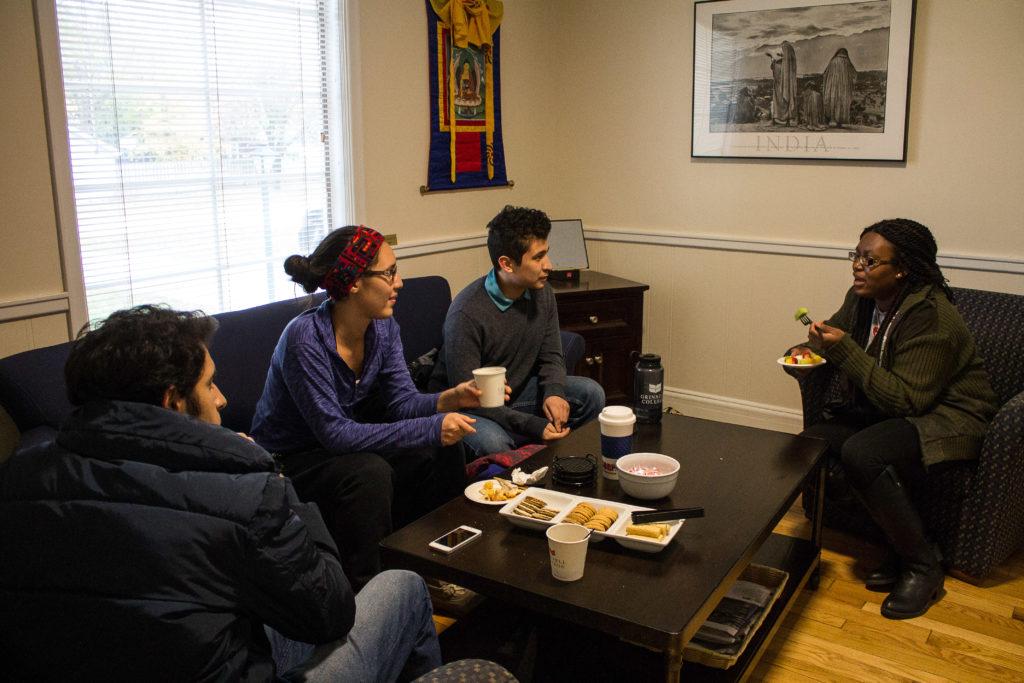
The Center for Religion, Spirituality and Social Justice (CRSSJ) hosted an open house last Monday to establish its new building’s presence in the community. Near the corner of 8th Ave. and Park St., the relocated CRSSJ looks like any other Grinnell home. The house, single story and partially obscured by a tree, is not by any means extravagant. But its simplicity contributes to the welcoming atmosphere that pervades the center.
“I think we try to create a space that feels like a sanctuary and a home,” said Rabbi Rob Cabelli. “A place where [students] can go and know that, during regular operating hours when staff are here, there will be people who know they are there and welcome them. A place where students can study and hold meetings that also does not feel like a sterile or anonymous space.”
The CRSSJ relocated during the summer, moving across the street from 1233 Park St. to the current location, 913 8th Ave. The CRSSJ and three language houses relocated to make way for the construction of the College’s new admissions building. While the language houses were lifted off their foundations and moved to their new locations, the old CRSSJ building was completely demolished because it lacked structural stability. The center then moved to a house owned by the College previously used to rent out to faculty and staff while they searched for a more permanent residence in town.
“The idea was that we would all start back August 1 and things would be up and running here, which was more or less the case,” Cabelli said. “We were able to do things, but some of the things necessary with respect to P-card access and things of that nature were in some cases not functioning until well into the school year.”
Deanna Shorb, dean of religious life, appreciated the diverse crowd that the CRSSJ opening attracted.
“[I am] very grateful to students, faculty and staff who took their time to come on what was arguably a very cold and windy [day] to celebrate and see our new space,” Shorb said. “We extended an invitation to make sure that townsfolk knew that they could come and a number of community members came. It wasn’t just people who knew me, it was people who read about it in the paper or saw it on posters. … So I was delighted to see such a diverse turnout.”
The CRSSJ waited to have their open house until after some of the larger renovation projects on the building were completed, like planting grass and pouring concrete for sidewalks.
“I think it will take until next fall to have everything ready,” Shorb said. “There are still details.”
These details include the unfinished backyard and planned creation of signs to help people understand how to use the building.
After the initial commotion of moving, Cabelli is quite happy with the new building. While the old building had two stories, the new CRSSJ boasts more space overall and a finished basement that houses a lending library, a resource for students who qualify based on need.
During the moving process, the basement was transformed from a dungeon of exposed cinderblock and unfinished ceilings to a cozy space with hardwood floors, bookcases, armchairs and even a flat screen TV.
The College also constructed an addition to the building to create Muslim and Hindu prayer and cultural spaces, something Cabelli cites as a success in the transition to the new building.
Shorb is currently working with Muslim and Hindu communities to decorate their respective prayer and cultural spaces. The Muslim prayer space so far has a comfy couch and an intricately patterned rug, as well a shelf holding prayer rugs and other decorations. In the Hindu prayer space, one wall is painted saffron, the same color of orange that is on the Indian flag. The pop of color draws attention to Ganesh, who sits on a table against the wall.
At their new home, the CRSSJ hopes to continue providing spaces, resources and support for students and community members of all cultural, spiritual and religious backgrounds and identities.
“In a certain sense, the center functions to try to do anything that we can to help students find community,” Cabelli said. “That may be community tied to identity, patterns, or profiles, constellations of identity, intersections of identity … whatever it is. And obviously some of it concerns religious or spiritual, but also cultural, also all forms of identity.”
According to Cabelli, the CRSSJ is essential in helping students find community on a small college campus.
“On one hand, [Grinnell] can be this nourishing bubble,” Cabelli said. “But on the other, people can often feel the degree to which they stand out. To be seen as other, in fact, by others in this small town — I think it means the need to find community is all the more precious and important.”

























































